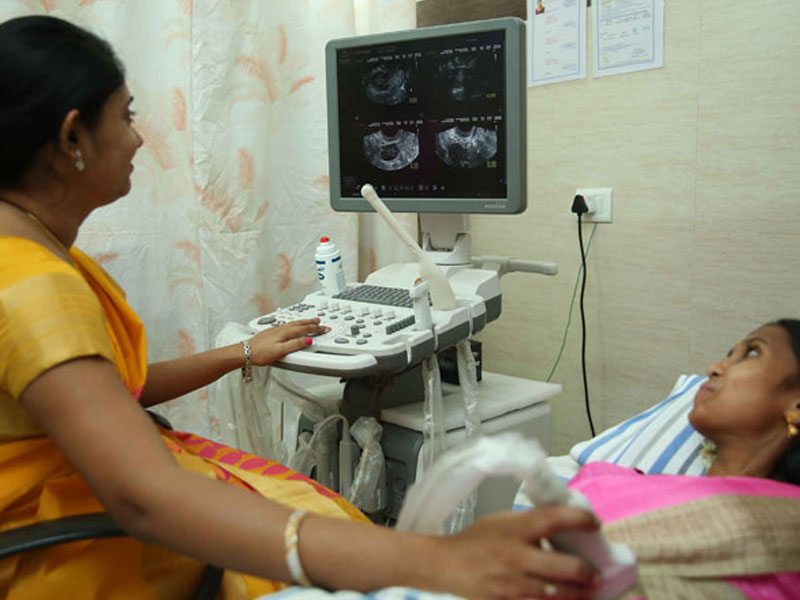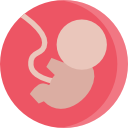
Fertility Center in Tamilnadu

Female Infertility
It means inability to get Pregnant after one year or six months of trying and if a woman is 35 or older. This diagnosis is therefore shared by 20% of couples attempting to conceive.
1. Failure to Ovulation
Ovulatory disorders are one of the most common causes of unable to get Pregnant. Ovulation problems are often caused by Polycystic Ovarian Syndrome (PCOS).
• Scarred Ovaries
• Premature Menopause
• Follicle Problems
2. Hormonal Problems
The process of Ovulation is based on the imbalance of hormones. Because of body isn't going through the usual hormone changes that lead to the release of an egg from the ovary and the thickening of the lining of the Uterus.
• Not able to produce matured Eggs
• Not able to Function of the Hypothalamus
• Abnormal function of the Pituitary gland
3. Damage of Fallopian Tubes
• Infection
Bacteria and viruses are usually affects Fallopian Tubes, it's like a Sexually Transmitted Disease.
• Abdominal Diseases
Most common in Appendicitis and Colitis, it causes inflammation of the abdominal cavity and it can affect the Fallopian Tubes and lead to blockage & scarring.
• Previous Surgeries
Pelvic and abdominal surgery can result in alter of the Fallopian Tubes in such a way that eggs cannot travel through them.
• Ectopic Pregnancy
This is a Pregnancy that occurs in the Fallopian Tube itself, so it can also cause tubal damage
• Congenital Defects
Women may be born with tubal abnormalities, usually associated with uterus irregularities.
4.Others
• Physical problems with the Uterus
• Uterine Fibroids
• Irregular Menstrual period
• Over weight
• Sexually Transmitted Disease
• Over stress
• Age < 35 years
• Stress
• Poor diet
• Smoking
• Excess alcohol use
• Athletic training
• Being overweight or underweight
Symptoms of infertility are often related to other conditions, such as, 15 to 20 percent of untreated cases will lead to Pelvic Inflammatory Disease. It leads to blockage of the Fallopian Tubes, which prevents Fertilization.
1.Irregular periods
The normal woman's Menstrual cycle is 28 days long. But anything within a few days of that can be considered normal, as long as those cycles are consistent. For example, a Woman who has a 33-day cycle one month, a 31-day cycle the next, and a 35-day cycle after that, is probably having "normal" periods.
2.Painful or heavy periods
Most Women experience cramps with their periods. But painful periods that interfere with your daily life may be a symptom of Endometriosis.
3. No periods
No periods, are not uncommon for Women to have an off month here and there. Factors like stress or heavy workouts can affect your periods to temporarily disappear. But if you haven't had a period in months, it's time to get your fertility checked.
4. Symptoms of Hormone Abnormalities
• Skin problem
• Reduced sex drive
• Unwanted facial hair growth
• Thinning hair
• Excessive weight gain
5. Pain during sex
Some Women experience pain during sex for their entire lives. It could be related to Hormone problem to Endometriosis, or to be other underlying conditions that could also be contributing to infertility.
6. Others
• Genital infection
• Pelvic infection
• Endocrine Dysfunction
• Miscarriages
• Sexual Dysfunction
• Irregular Menstrual cycles
• Polycystic Ovarian Syndrome (PCOS)
• Uterine Fibroids
• Endometriosis
History and Physical examination
First and foremost, your fertility doctor will take a very thorough medical, surgical and fertility history. A physical examination may also be performed.
Transvaginal ultrasound
Ultrasound is an important tool in evaluating the structure of the Uterus, Tubes, and Ovaries. Ultrasound can find out Uterine abnormalities such as Fibroids and Polyps, Distal Fallopian Tube Occlusion, and Ovarian abnormalities including Ovarian cysts.
Laboratory testing
The most common of these tests include measurements of blood levels of certain hormones such as Estradiol and Follicle Stimulating Hormone (FSH), which are related to ovarian function and overall egg numbers; Thyroid Stimulating Hormone, which assesses Thyroid function; and Prolactin, a hormone that can affect Menstrual function if elevated.
Hysterosalpingography (HSG)
A doctor injects dye or saline and air into your cervix, which travels up to your Fallopian Tubes and an X-ray is taken. With this method, your doctor can check to see if the tubes are blocked.
Laparoscopy
Laparoscope is a slender tube fitted with a tiny camera inserted into the abdomen through a small cut near your belly button. This lets to view the outside of your Uterus, Fallopian Tubes, and Ovaries to check for abnormal growths and also see whether the Fallopian Tubes are blocked.
Ovarian Reserve Testing
This Ovarian Reserve Testing is to determine the quality and quantity of eggs available for ovulation.
Genetic Testing
This test helps to find out whether there's a genetic defect causing infertility.
Laparoscopy
If you have been diagnosed with Tubal or Pelvic disease, one option is to get surgery to reconstruct your reproductive organs. It puts a Laparoscope through a cut near the belly button to get rid of scar tissue, treat Endometriosis, open blocked tubes to remove Ovarian cysts, which are fluid-filled sacs that can be formed in the ovaries.
Hysteroscopy
In this procedure, a Hysteroscope is placed into your Uterus through the cervix. It's used to remove Polyps and Fibroid tumors, divide scar tissue, and open up blocked tubes.
Medication
• Clomiphene Citrate (Clomid)
• Human Menopausal Gonadotropin or hMG (Repronex, Pergonal)
• Follicle-Stimulating Hormone or FSH (Gonal-F, Follistim)
• Gonadotropin-releasing hormone (Gn-RH) analog
• Metformin (Glucophage)
• Bromocriptine(Parlodel)
Intrauterine Insemination (IUI)
It is a process by which sperms are washed and prepared for placement into the Uterine cavity after Semen gets rinsed with a special solution and then centrifuged to separated motile sperm from immotile sperm and other cells. Those motile and viable sperms are then placed in a small amount of solution, and then very gently and painlessly injected into the Uterine cavity using a very thin, soft, and flexible catheter. At least any one open tube is required for IUI, and any sperm's abnormality cannot be severe, otherwise the sperm will not be able to swim to and fertilize the egg.
In Vitro Fertilization (IVF)
This involves collecting matured eggs from a Woman, fertilizing them with a Man's sperm in a dish in a lab, and then transferring the Embryos into the Uterus after fertilization. IVF is the most effective Assisted Reproductive Technology. An IVF cycle takes several weeks and requires frequent blood tests and daily hormone injections.
We at Sakthi Fertility provide all under one-roof. It serves as one of the best centers for Assisted Reproductive Technology treatment in Udumalpet, Coimbatore and many infertile couples are benefitted with our fertility treatment and have a complete family. Sakthi Fertility center has skilled specialists in Infertility Treatment, Pollution free environment, innovative financing programs, and patient friendly and provides the best services to fulfil the patient's dream of having a baby. It has treated multiple number of Female infertility in Udumalpet, Coimbatore and Tamilnadu, India region.
For More Information: +91 96 26 200 600
Consult Us
We are here to answer any questions about your fertility treatment and we'll respond as soon as we can.
















.png)



.png)
.png)
.png)

.png)
